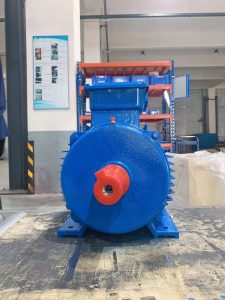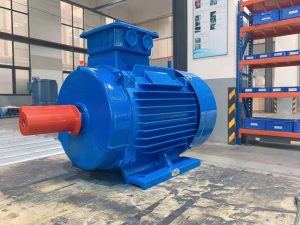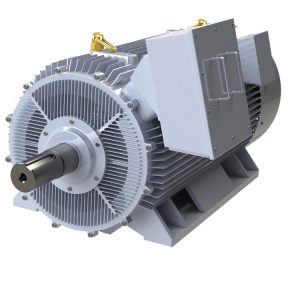Permanent magnet motors depend on permanent magnets’ magnetic fields and not electromagnets as it is in conventional motors. Based on this concept, the design is less complicated since they do not require electric current to induce magnetism, hence reducing energy consumption. Because the magnetic field of the rotor interacts directly with the stator, torque is created, allowing for movement without other electromagnetic complications. PMMs are almost always synchronous motors, their rotation synchronized with the frequency of the supply current, therefore maintaining consistent performance under all conditions.
The main elements of the permanent magnet motor consist of the rotor, stator, and permanent magnets themselves. Permanent magnets are housed inside the rotor, while the stator is made up of windings that energize a magnetic field. This design outlines incorporating magnetic design into electrical principles. Moreover, configurations such as surface-mounted and interior-mounted further dictate the performance and application suitability of the motor, enabling an engineer to tailor the motor for certain tasks.
Among the outstanding advantages of permanent magnet motors is their great efficiency in energy conversion. As opposed to conventional induction motors, PMMs convert a higher percentage of electrical energy into mechanical energy, therefore keeping energy costs and waste down. This efficiency becomes important in applications where energy conservation directly contributes to operational costs and sustainability goals. Minimum losses in energy conversion further allow for extended times of operation and reduced need for power supply resources.

With a high power density, the PMMs can generate higher outputs as related to size. Such a factor makes them especially helpful for applications that are space-limited. High power density enables a manufacturer to design a small-sized machine that will still operate effectively, thereby leading to better flexibility in the design of equipment. The results are that even highly sensitive industries, like automotive and aerospace, benefit tremendously from the machines as these can maintain functionality while sustaining weight and spatial requirements.
With increased efficiency in permanent magnet motors, greenhouse gas emissions are tremendously reduced, further contributing to a low carbon footprint. As industries seek to be more sustainable, PMMs have presented a way forward through the dramatic reduction of energy wastage. These motors align with green initiatives, enabling organizations to comply with environmental regulations and contribute positively to climate goals. This integration of energy-efficient technologies can be a key factor in corporate social responsibility strategies.
PMMs are built for lower energy consumption in their operational cycles. It also drastically cuts the overall operating cost and conserves natural resources in a more resource-efficient manner. In various industry operations-including, but not limited to, manufacturing industries, renewable energy production, and HVAC-large opportunities have arisen to make potential economic savings by substituting other electric motors with PMMs. Companies are more willing to position PMMs in the development of a sustainable energy future.

Permanent magnet motors are indeed more durable because of the simplicity of the design and fewer moving parts. Not having brushes means no motor wear and tear, hence longer life spans and fewer instances of replacement. This again brings down the long-term cost both for the user and the maker, making PMMs very cost-effective investments. Such endurance is crucial for applications in the most demanding environments where a great deal of productivity depends on eliminating downtime.
Besides long life, permanent magnet motors require low maintenance compared to other types of motors. Without brushes and with the strong construction of PMMs, servicing becomes less frequent; thus, operators are more productive instead of being concerned with the motor’s maintenance issues. This feature is quite helpful for those industries that need to keep their operations running without any stoppage, like manufacturing and transportation. The overall reduction in maintenance effort and costs fits well within the operational goals of modern industry, where efficiency is paramount.
Therefore, permanent magnet motors provide fundamental advantages in design, increased efficiency, environmental considerations, and reduced maintenance requirements. This makes PMMs the best option for contemporary uses across broad applications and expands their use in modern-day competitive and eco-sensitive scenarios. Permanent magnet motors may help industries move ahead in the direction of efficiency, sustainability, and productivity at all operational levels.
Enneng is an established company leader in the design and manufacturing of permanent magnet motors, putting broad industry knowledge into innovating motor solutions to meet the changing demands of modern applications. The company’s emphasis on research and development has kept it abreast of motor technology and strives to provide dependable, efficient, and sustainable solutions in the industry. Quality and performance have become the cornerstones of Enneng in its dealing with clients looking for advanced motor options.

Product innovations and technologies by Enneng have contributed a great deal toward continuous improvement in the performance of permanent magnet motors and reductions in operational costs. Advanced materials and manufacturing techniques are key ingredients in creating more efficient and robust PMMs to tackle very specific industrial challenges. Innovation can be made in thermal management, power densities, and energy conversion efficiencies that ensure relevance in the motors produced by Enneng in competitive markets.
Another unique aspect of the company is the focus on smart technology integration into permanent magnet motor design. The Enneng Motor installs sensors and a control system in its motors to enable real-time monitoring and adjustments in the performance of the motors, hence optimizing efficiency. This is a mixture of innovation and technology meeting the growing demand for automation and intelligence in modern manufacturing processes, hence positioning Enneng as one of the most forward-thinking players in the industry.
Owing to its commitment to excellence in the permanent magnet motor field, Enneng has gained numerous recognitions and awards within the industry. These recognitions denote leadership and innovation that the company has been able to realize within the motor manufacturing sector. The recognition by leading industry organizations reflects not only the quality and performance of Enneng but also its commitment to sustainability and environmental stewardship.
As industries move toward increasingly stringent performance and efficiency standards, Enneng’s achievements serve as validation of its extensive investment in research, development, and quality assurance. Such acknowledgment not only enhances the company’s credibility but also reinforces its position as a trusted partner for businesses seeking successful implementation of permanent magnet motor solutions in their operations.